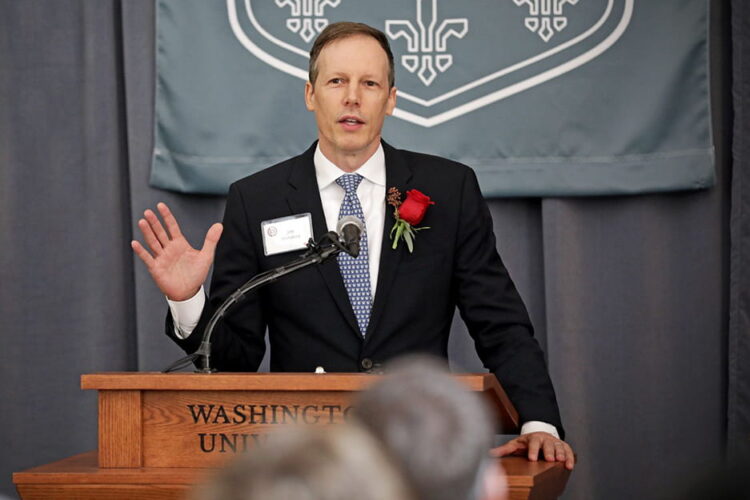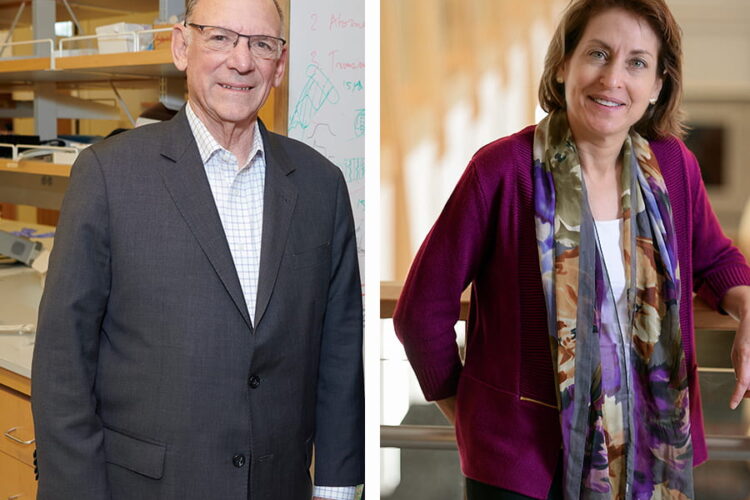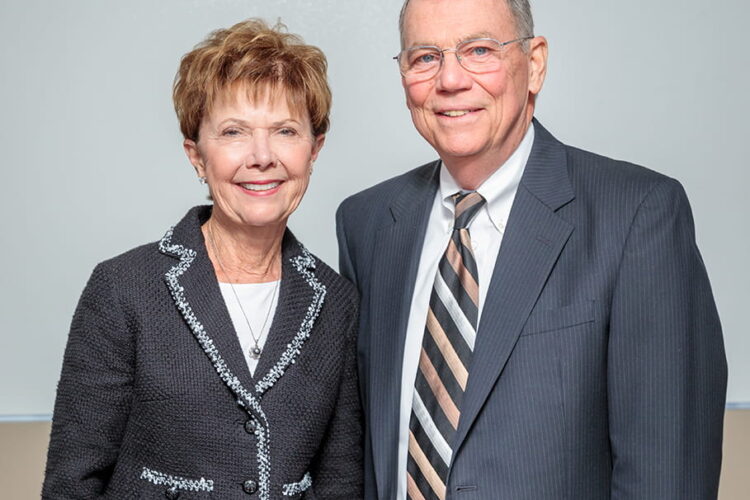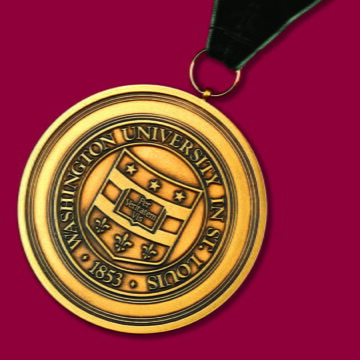
Great professors are the backbone of great universities. Exceptional teachers, scholars, and researchers extend the frontiers of knowledge and inspire students to become leaders capable of great achievement and service to society.
Attracting and retaining outstanding faculty members is a priority for Washington University. Endowed professorships, a key strategy for achieving this goal, allow the university to recognize the contributions of dedicated faculty members and provide increased support for their work.
Beyond a commitment to strengthening the university, donors who endow professorships and other faculty positions are motivated by a variety of factors, including a desire to recognize outstanding teachers and mentors; give thanks for the institution’s role in their lives; and further its mission to teach, discover, and serve.
During Leading Together: The Campaign for Washington University, 153 endowed positions were created, including the university’s first endowed deanships and coaching position. Spirit of Washington University editor Mary Lee spoke with an alumna, corporate partner, and former faculty member about their reasons for establishing positions.
Deborah Beckmann Kotzubei and Jacob Kotzubei Distinguished Professorship
Donors: Deborah Beckmann Kotzubei, AB ’91, and Jacob Kotzubei
When Deborah Beckmann Kotzubei arrived at Washington University in 1987, she was an Arts & Sciences student who wanted to pursue a career in automobile design. She changed her mind after taking a class in mechanical engineering. Shifting gears, she immersed herself in her liberal arts classwork, and a new passion for political science emerged—thanks in large part to several excellent teachers. She eventually chose to major in that field and economics.
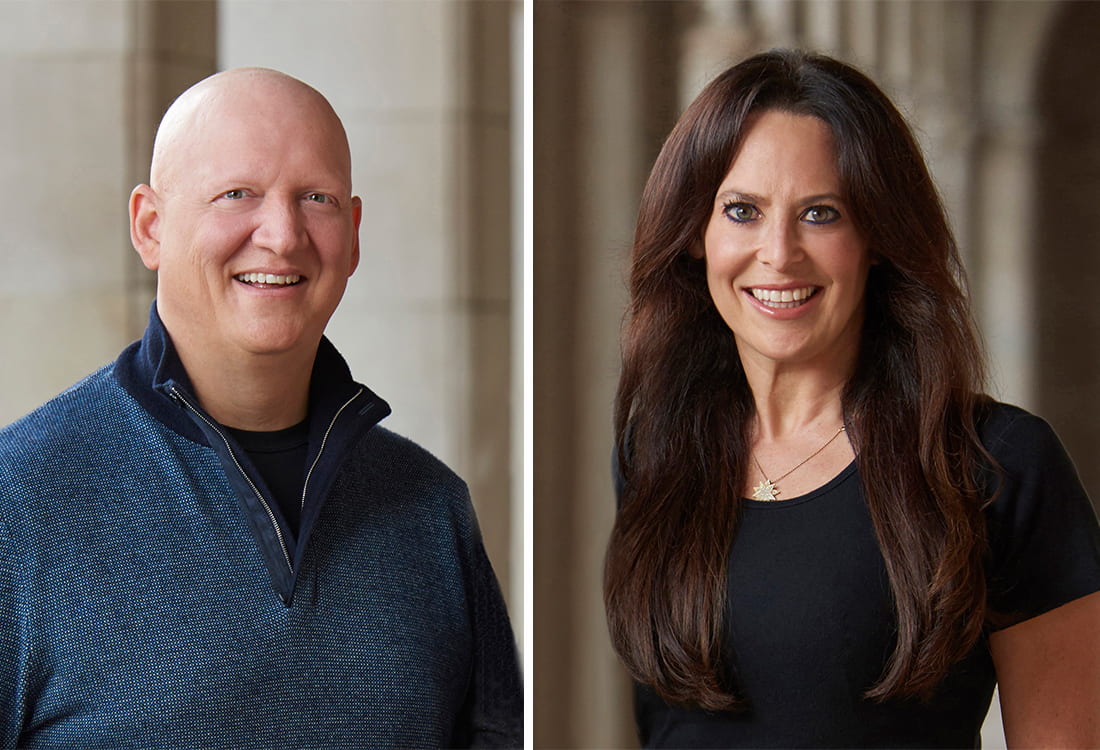
Though she went on to complete a law degree at Columbia University, practice as a mergers and acquisitions attorney, and raise a family with her husband, Jacob, Ms. Beckmann Kotzubei never forgot her time at Washington University. Longtime supporters of Arts & Sciences, she and Mr. Kotzubei have provided gifts for undergraduate research and scholarships. In June 2018, they made a commitment to establish a professorship in Arts & Sciences. Ms. Beckmann Kotzubei also serves as a member of the Arts & Sciences National Council.
Q&A with the Kotzubeis
What led you to establish a professorship in Arts & Sciences?
Deborah: For many years, I thought that if we ever had the opportunity and ability to endow a professorship, it would be one of the most powerful ways to help the university. My time at WashU was wonderful. The biggest reason my experience was so transformative was my professors. In particular, I had very deep conversations with many of my political science professors. They truly affected the way I think about life, both then and now. As an undergraduate, I didn’t know this was so unusual. But after I began working as an attorney, many of my colleagues were surprised when I described the frequency and breadth of the interactions I had with my professors. No one I knew had that type of experience at other schools. I think it’s really important for the university to continue to offer an environment where outstanding faculty members can connect with students and have a profound impact on their lives.
Were there any particular professors who influenced you when you were an undergraduate?
Deborah: Bill Lowry, who is still a professor in the political science department, really awakened my desire to learn about government. He always believed in me and was a champion for me. I never took a class with the late U.S. Sen. Thomas Eagleton, but I became the first undergraduate research assistant to work for him after one of his graduate students recommended me. Professor Eagleton was an inspirational figure. And political science professor Lucius Barker taught an incredible constitutional law class. I decided to go to law school because of that course.
How has your involvement with the Arts & Sciences National Council influenced your philanthropy?
Deborah: I enjoy coming back to campus for national council meetings. I feel like I’m a student again, and I want to learn everything. I am grateful for the opportunity to hear professors talk about their work. I love getting updates from the university. I often share articles with Jacob, and we discuss the importance of the research and scholarship that occurs there. We see our gifts as an investment in the future.
Mr. Kotzubei, what led you to join your wife in supporting Washington University?
Jacob: Debbie has always raved about her experience at the university, from the quality of the classes and professors to the lifetime friendships she formed with fellow students. And I have been so impressed with the research coming out of the university. I feel great about helping to ensure that tomorrow’s students can benefit from a community of excellent faculty members.
Steven H. and Susan U. Lipstein Distinguished Professorship in Public Health
Donor: BJC HealthCare
In April 2018, BJC HealthCare established a distinguished professorship at Washington University in honor of its former president and CEO, Steven Lipstein, and his wife, Susan, a retired physician assistant and Parents as Teachers educator. Mr. Lipstein led the nonprofit health-care system—Washington University School of Medicine’s clinical partner in the St. Louis region—for 18 years. During this time, BJC grew to 15 hospitals and more than 31,000 employees. He also served as a member of the university’s Board of Trustees.
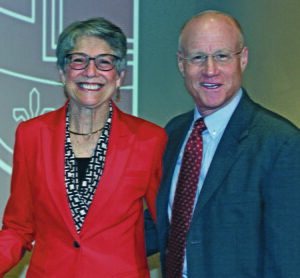
In addition to the professorship, BJC has invested substantial resources in the university’s public health programs in recent years. The system endowed the directorship of the Institute for Public Health in honor of Larry Shapiro, former dean of the medical school, in 2016 and provided funds for annual and endowed scholarships for public health students at the Brown School in 2010.
Ross Brownson, an educational and practice leader in the field of evidence-based public health, was installed as the Lipstein Distinguished Professor on March 26. Brownson is an authority on the effects of the built environment and public policy on physical activity and obesity. A faculty member at the Brown School and School of Medicine since 2008, he also serves as director of the Brown School’s Prevention Research Center.
Q&A with Richard Liekweg, current president and CEO of BJC HealthCare
What was BJC’s primary reason for establishing this professorship?
This distinguished professorship represents our desire to honor the legacy of Steve and Susan, who gave so much to BJC HealthCare, Washington University, and the St. Louis community. When the Lipsteins let us know that the time had come for them to move on to the next chapter of their lives, we wanted to do something lasting and meaningful to say thank you. Working with the university, we concluded that establishing a distinguished professorship in public health was the perfect way to recognize them.
Why did BJC choose to support a professorship in public health?
Those of us who have spent time around Steve and Susan know they are passionate about ensuring that all individuals have access to high-quality health care, education, and economic security. They reminded us that these are the foundations upon which stable families, neighborhoods, and regions are built. Unfortunately, that stability is out of reach for many. During Steve’s time at BJC, he helped us understand the social determinants that prevent our region from being a healthy community. These determinants include many of the challenges associated with poverty: job insecurity, lack of reliable transportation, food instability, and exposure to crime and violence.
The traditional view of health-care delivery would have us believe that those are problems for others to solve. However, a true public health model seeks to identify innovative ways to address these social determinants. The sustainable gift of a professorship will allow the university to support an outstanding faculty member who can develop solutions for seemingly intractable issues that affect health.
What are your hopes for the position?
Ross Brownson is an internationally recognized expert in chronic disease prevention and applied epidemiology. We look forward to working more closely with him and other faculty members at the university to address the social factors that negatively influence the health of people in our region. We know that progress will require time, energy, and a willingness to stay in the game. We also know that we cannot afford to be complacent. We owe it to our community to approach this work with the same tenacity that we approach finding the next medical cures and educating the next generation of health-care providers.
Laurence H. Meyer Professorship
Donors: Laurence and Florence Meyer
Distinguished economist Laurence Meyer served as a faculty member at Washington University for 27 years. During his tenure, he launched a consulting firm with two of his former students. The company, which used emerging computer technology to provide low-cost macroeconomic modeling services, quickly developed a reputation for its forecasting accuracy, and Dr. Meyer was recognized as a leading economic forecaster by Business Week.
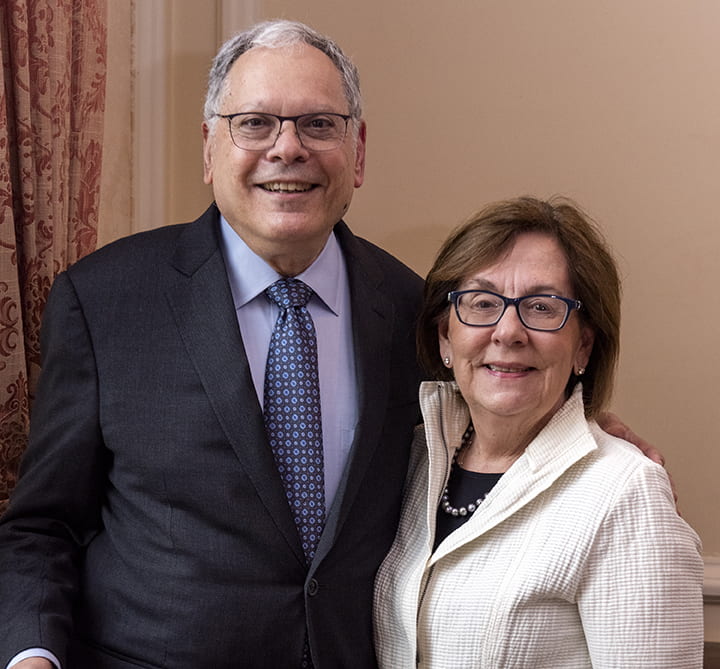
Dr. Meyer left the university in 1996, after he was confirmed as a member of the Federal Reserve System’s Board of Governors. He served in that role until 2002. He currently is president of Monetary Policy Analytics, a Washington, D.C., advisory firm focused on global macroeconomics and monetary policy that he founded in 2016.
Along with his wife, Florence, Dr. Meyer made a commitment in March 2018 to establish a professorship in Arts & Sciences at the university through his estate. The couple also has provided gifts for scholarships and unrestricted purposes in Arts & Sciences.
Q&A with Laurence Meyer
How did you come to be a faculty member at Washington University?
When I was finishing up my doctorate coursework at MIT in the late ’80s, my mentor, Nobel laureate Franco Modigliani, told me he received a call from Washington University about a faculty position in the university’s Department of Economics. He thought I should go visit. I did, and I really liked the fact that it was an excellent school with a strong undergraduate program. It seemed like a good place for me to grow as an economist and scholar.
You stayed at the university for 27 years. What kept you here?
I absolutely love to teach. Nothing is more rewarding than having former students tell you how much they learned in your class. I take pride in their success. But as a professor, you must publish or perish, and I found that I didn’t really enjoy research. As I was concluding a three-year term as chair of the economics department in 1982, I sat back and thought about my life and my career.
I decided I wanted to start a consulting firm. I told the dean about my plan and asked if I could stay on the faculty. John Biggs [PhD ’83], who was vice chancellor for administration and operations at the time, was my champion. The university ultimately agreed.
I would not have been able to do this at other universities. That’s one of the reasons I have such an attachment to Washington University. It gave me opportunities to grow as an economist, get some visibility for my research, and begin working in the private sector. It opened the door for my public service with the Federal Reserve. I wouldn’t be where I am today without the university.
Is that why you decided to establish a professorship in Arts & Sciences?
It was always a dream for me. I think many of us want to leave a legacy, something that has some permanence to it. This professorship allows me to leave something behind at a place that played a formative role in my career. I wanted to give back to Washington University because of what the institution has done for me.
